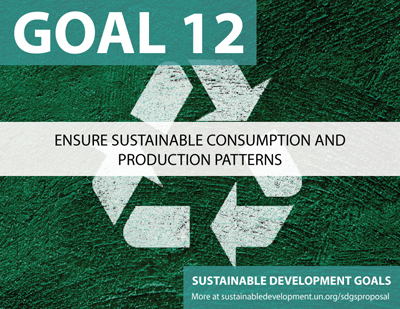|
Working Group discussing Goal 12 “Ensure sustainable consumption and production patterns”

The concept of sustainable consumption and production has been recognized in the Johannesburg Plan of Implementation adopted in 2002 at the World Summit on Sustainable Development (WSSD). Since then, many global, regional, and sub-regional meetings have acknowledged that sustainable consumption and production can contribute to objectives and requirements for sustainable development, together with poverty eradication and effective use of management of natural resources to accelerate economic and social development. Education can play an essential role in producing a pool of critical citizens, who are well equipped to analyse and select from among the pile of information provided by the media/other sources aimed at encouraging them to consume, and who can implement certain criteria to allow them to make consumption choices that are more environmentally and socially responsible. There is a disconnect between behaviour and technological advancement, which could be addressed through education. Keeping the above in mind, the workshop will focus on reflecting the cause-effect relationship between consumption and production and between consumption and the environment with a continuous focus on need and ways for translating such relationships to relevant stakeholders through education. It will deliberate on certain key concepts of SCP, critical analysis of the impacts, share goals and activities of existing SCP initiatives, and way towards putting new attitudes and behaviour through education. Topics like efficient use of natural resources, achieving environmentally sound management of chemicals and all waste through their life cycle, integration of sustainable production/ practices in companies, assessment of scientific and technological capacities to move towards Sustainable patterns of consumption and Production and sustainable tourism will be discussed in the working group.
This workshop had stakeholders engaged in advancing sustainable consumption and production (SCP), including government representatives, entrepreneurs/SMEs, industries, civil society, academia, researchers, private sectors and international organizations.
CEE Focal Point: Reema Banerjee
Workshop Sessions
| Date & Time | Session Title |
11 Jan 2015 |
|
Session I |
Introductions and Welcome Remarks (05 min) Introduction towards Educational for SCP |
15:00-16:00 Hrs |
Sustainable Consumption and Production: Guiding/Learning Exercise: (40 min) Educational/capacity building efforts and policy decision that could be promoted for embedding SCP education in Higher education system: Dr Shaleen Singhal, TERI (20 Min) |
Session II |
Skill Development and Transfer of Knowledge Dr. Lakshmi Raghupathy, Visitng Faculty, TERI University, New Delhi Mr Rajat Batra, CEO, STENUM Asia Sustainable Development Society Dr Malini Balakrishnan, Senior Fellow, The Energy and Resources Institute (TERI) |
Jan 12, 2015 |
|
Session III (2 Hrs) 11:15- 11:55 hrs |
Review of Existing and Proposed SCP Initiatives Dr Shaleen Singhal: TERI/SWITCH ASIA Sarojini Kaul, Project Manager, Cooperation, EU Delegation to India W.K. Pathnadeera, Senior Programme Officer, SACEP Dr. Roger Petry, Associate Professor of Philosophy, and Coordinator, RCE Saskatchewan, Luther College at the University of Regina Dr. Lakshmi Raghupathy, Former Director, MoEF & CC and Visitng Faculty, TERI University, New Delhi Mrinal Mathur, Madras School of Economics Rajan Gandhi, CEO, Society in Action Group Chinmai Hemani, Climate Change & Sustainability Consultant Dr. Christa Henze, Researcher and lecturer on Education for Sustainable Development (ESD) and Faculty of Biology at the University of Duisburg-Essen Nimesh Ved, Freelancer
|
11:55 – 13:15 hrs |
Review of Existing and Proposed SCP Initiatives with focus on education and capacity building initiatives taken One step Back, two steps forward: A Case study of Gurukulam (Vimukati Vishwa Vidayalay) - an alternative educational system promoting principles of sustainability and consumption choices through virtue promotion: Ms. Chinmai Hemani (15 min) Open Forum:
|
Session IV (1.5 Hrs.) |
Education for SCP Dr Sanjeevan Bajaj, FICCI Quality Forum (20) Mr Rajan Gandhi, CEO Society in Action Group (20) George Cheriyan, Director, CUTS International Dr. Shaleen Singhal, Head of the Department of Policy Studies, TERI University
|
Jan 13, 2015 |
|
Session V (1 Hr.) |
Opportunities Nari Nishimura, Associate Programme Management Officer, UNEP |
Session VI |
Formulating Recommendations
Valedictory and Vote of Thanks |


